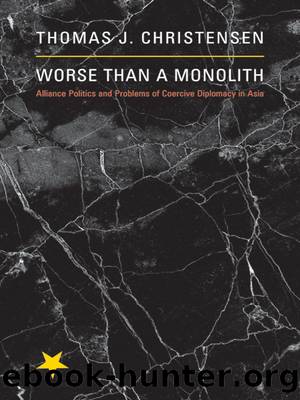Worse Than a Monolith by Christensen Thomas J

Author:Christensen, Thomas J. [Christensen, Thomas J.]
Language: eng
Format: epub
ISBN: 978-1-400-83881-3
Publisher: Princeton University Press
Published: 2011-06-15T00:00:00+00:00
Frustration with Khrushchevâs moderation was not limited to Asian communists. The East Germans also disagreed with Khrushchevâs moderate policies on Berlin, requesting permission to close the border to West Berlin throughout the 1950s.15
The Great Leap Forward and the 1958 Taiwan Strait Crisis
On the domestic front, problems like the drying up of Soviet capital aid and the declining utility of Soviet advice in solving various bottlenecks in the more backward Chinese economy would also encourage Mao to reduce his dependence on Soviet advice and strategies. Only someone of Maoâs ideological ilk might have tried to solve his economic problems with a disastrous, radical, and largely utopian set of policies like the Great Leap Forward (1958â61). So we must recognize the ideological and psychological roots of the Great Leap Forward, which was hardly a rational response to objective factors. But one can, at least, fairly state that the reconsideration of economic policy during the First Five Year Plan that lay at the foundation of the Great Leap was itself rooted in some real problems.16 As I have argued in much more detail elsewhere, fears and suspicions regarding his relations with Moscow only made Mao even more radical at home and somewhat more aggressive abroad. The Great Leap itself had international dimensions as a way for Maoâs China to gain more independence from and strength in its relations with the Soviet Union and within the international communist movement. The Great Leap was also an early indication of Maoâs desire to assert his own model of revolutionary and social change as an alternative to the post-Stalin Soviet model. This would become more obvious during the 1960s, particularly during the Cultural Revolution, but the initial impetus can be found in the late 1950s, as Mao became increasingly disillusioned with Stalinâs successors and increasingly confident about his own rightful place as a co-equal or superior to his Soviet counterparts. In many senses, the Great Leap was Maoâs first attempt to market himself as a natural leader of the international communist movement.17
Internationally, the domestic requisites of the Great Leap made Mao more aggressive, rather than less so. Mao used conflict in the Taiwan Strait to mobilize his public around nationalist themes during the more radical phases of the Great Leap and demonstrate his independence from the Soviets internationally.18 In the late spring and early summer of 1958 in the earliest phases of the Great Leap policies and in the leadup to the Taiwan Strait crisis, Mao would attack revisionism in the socialist statesâ foreign policy and call for a more aggressive foreign policy posture.19 So, even in its nascent stages the competition for leadership in a hierarchical revisionist alliance caused problems for the United States in its coercive diplomacy toward the communist camp.
No matter how quixotic it proved to be in the end, practical implementation of the Great Leap required great sacrifice from the vast majority of Chinese citizens. Maoâs need to sell the program to his population also encouraged him to escalate tensions with the United States and to manipulate a crisis in the Taiwan Strait for purposes of domestic mobilization.
Download
This site does not store any files on its server. We only index and link to content provided by other sites. Please contact the content providers to delete copyright contents if any and email us, we'll remove relevant links or contents immediately.
The Radium Girls by Kate Moore(10961)
The Templars by Dan Jones(4218)
100 Deadly Skills by Clint Emerson(4124)
Rise and Kill First by Ronen Bergman(4059)
The Doomsday Machine by Daniel Ellsberg(3768)
The Rape of Nanking by Iris Chang(3564)
Killing England by Bill O'Reilly(3486)
Hitler in Los Angeles by Steven J. Ross(3470)
Stalin by Stephen Kotkin(3116)
12 Strong by Doug Stanton(3077)
Hitler's Monsters by Eric Kurlander(2760)
Darkest Hour by Anthony McCarten(2673)
Blood and Sand by Alex Von Tunzelmann(2630)
The Art of War Visualized by Jessica Hagy(2442)
Hitler's Flying Saucers: A Guide to German Flying Discs of the Second World War by Stevens Henry(2320)
The Code Book by Simon Singh(2246)
The Second World Wars by Victor Davis Hanson(2149)
Babylon's Ark by Lawrence Anthony(2092)
Tobruk by Peter Fitzsimons(2079)
